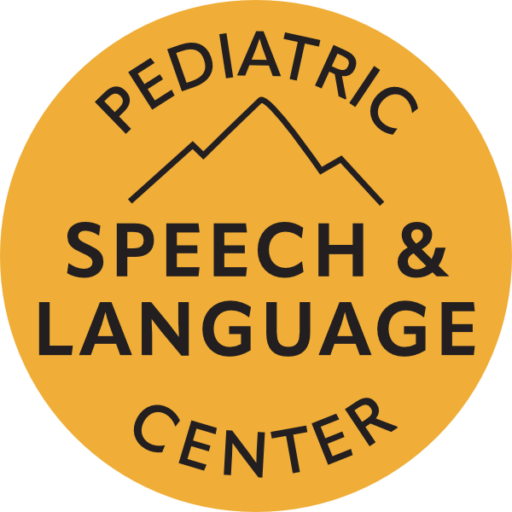It’s that time of year (even a little early!) when we never know if it will be snow or shine in Colorado. (or both at the same time). Here is our updated weather policy:
Inclement Weather Policy
Looking for In-person Speech Therapy? Teletherapy? We have you covered!

School is here and so are scheduling changes! We are currently able to offer both In-person and Teletherapy spots. We have some immediate openings for both! Call 719.377.2523 today to set up an intitial evaluation!
This Is Your Brain…on Screens

As schools around the nation are hosting their first days of the 20/21 school year, a few topics of concern have been swirling through my Speech-Language Pathologist brain. Within a few short days in April, our speech clinic went from seeing our clients 100% in person to completely online, for as many as 7 hours per day. For the past six months in our practice, I’ve witnessed a slow but obvious decrease in toleration for tele-therapy. Our clients went from happily engaged to demonstrating an increase in behaviors, frustration, and in some cases, regression. I noticed a decline in my own energy level, mood, and overall health with relationships in my life. I began to worry that something was getting in the way of our connection with our students. Then, last week, we learned that most schools were to start back to school on an e-learning platform.
For years, research has been focused on identifying exactly what the relationship between excessive screen time and how our brain changes in it’s wake. From changing levels of gray matter, to increasing needs for dopamine given by the addiction of screens, we are starting to see a lot of “fall out” not only in children but in adults as well. Although we need several more years of study to gain a clear picture of long term ramifications, one thing we clearly understand is that the blue lights from screens effect our sleep thus making it more difficult to retain information, stabilize our moods, and concentrate throughout the day.
Because we live in such a digital age, we need to be mindful of the effects that prolonged screen use can have on our overall health. Not in fear of screens, but to respect that when our children are on the computer learning for 5 hours a day, we may need to say “no” to them spending several more hours on watching their favorite shows or playing games. For those kiddos and teachers who have chosen digital learning this semester, or those have not been given a choice, here are a few “brain break” tips for us to model for our kids.
- Beware of your own digital media distractions. Half of all kids and three-quarters of parents feel the other is distracted when talking to each other.
- Eat regular meals together without screens.
- Put down your device. Be present with others. Observe the world around you. Let your mind wander. Boredom is the key to creativity.
- Avoid blue light-emitting screen use before bedtime or turn on your blue light blocker.
- Play (limited) online games WITH your children rather than forbidding them. Learn how to play from them and, as you play, help them think about what they’re seeing and doing on screen.
- Help your children plan how to spend their time, focusing on important and favorite activities to avoid sliding into the screen abyss.
- Set a timer on your device that warns you when you’ve been on a certain amount of time.
- Disable social media during times when your family is together throughout the day.
- Make sure the teacher in a well-lit space so your child can clearly see his/her face.
Yesterday, as I nervously asked my son how his first day back was, his reply, “So awesome, best day ever!” Regardless of all of my hesitation with sending my kids back to school this year, I now know that it was exactly the right choice for our family. My kids knew they needed to be off of the computer and learning with their peers, and I’m glad I trusted them enough to put my own fears aside. Listen to your kids; they will tell you what they need, if not by words, then by their actions. This year, let’s see if we can form a few new habits in relation to technology, and make it the best year yet!
Sarah E. Van Winkle, M.S. CCC-SLP
5 Surprising Causes of Speech Delay

Sarah E. Van Winkle, M.S., CCC-SLP
“What caused my child’s delay? Was there something I did wrong?” As a Speech-Language Pathologist (SLP), these two questions are the most common questions asked by parents when I first meet them. The causes of speech-language delays are so versatile that there are no definitive answers. Therefore, my typical reply is something like, “Most kids develop in their own time; but, you did the right thing by seeking help”.
SLPs, are trained to be on the lookout for common speech delay ‘risk factors’ during our first interactions with your children; however, most of the intake questions only touch the tip of the iceberg. A child’s development is impacted by a host of factors, many of which are unknown or simply overlooked. In our ever-changing line of work, we strive to keep up with current research and hope that each day we are better clinicians than the day before. With that in mind, here are five less-familiar influences that could be guiding your child’s speech and language development.
- Screens
It’s so tempting to set kids in front of a screen when we need some peace and quiet. However, a pediatrician in Toronto studied 894 children and found that at their 18 month check-up, 20% of children were watching a hand-held device for an average of 28 minutes per day. The study went on to discuss that each 30 minute increase in daily screen time led to a 49% increase risk of expressive language delay[1].
Another study conducted by Cheung in 2017, found that touchscreen use was associated with less nightly sleep and later bed times. Cheung found children had a 16 minute loss of sleep for every hour spent on a screen[2]. This may not sound like much, but when we add it up over a week, that’s a lot of lost sleep during critical developmental times.
- Snoring
The jury is in that sleep is necessary for brain development, but let’s talk about snoring. While snoring may not be the cause of ineffective sleep, it can often be leading sign that your child isn’t getting enough oxygen at night, thus leading to disruptive sleep. When we ask parents if their child snores we usually get some odd looks. In turn, what we are truly asking is, “does your child have large tonsils or adenoids that are blocking their airway”. Obstructions of the airway can not only lead to lower cognitive function, but mouth positioning problems that often times require correction via speech therapy or dental intervention[3].
- Food
“Let food be thy medicine”, Hippocrates. Many studies have emerged in the past decade linking the gut health with brain health. Certain inflammatory foods, or inefficiency of nutrient rich foods, can lead to gut imbalance by reducing vitamin and mineral intake. Disorders including Autism, seizures, depression, and anxiety are understood to correlate with the microbiome in the gut; which could cause changes of behavior, cognition, and stress response [7,8]. Low inflammatory foods, including fish and vegetables, have been associated with a lower risk of cognitive impairment and slowing cognitive decline in older folks[9]. Therefore, your child’s food inventory may be an important topic we cover during your child’s evaluation.
- Siblings
In our clinic we often see siblings that share similar speech/language patterns. Research supports that siblings of individuals with language delays are more likely to have a delay than those without a sibling with a diagnosis[4]. Not only can a language delay in a sibling reduce the amount of words that younger siblings are hearing throughout the day, but siblings also take away maternal resources for the younger kids, resulting in less “talk time” with mom (or the primary caregiver)[5]. A study published in the Journal of American Academy of Child and Adolescent Psychiatry also found that a sibling of a child diagnosed with Autism has a 10-20% greater chance in being identified with characteristics of Autism themselves[6].
- Household Cleaners
A call to clean up our cleaning regime. Child exposure to household chemicals may also be tied to language delays. A study conducted at Ohio State University found, “significant associations with delays in language and cognitive development”, based on the report of 190 mothers[10]. When asked about their children’s exposure to toxicants, parents with reported higher levels of exposure were found to have children with lower language scores. Some chemicals, including several medications, have also been linked to have negative effects on hearing and balance. Those associated include:
• Arsenic– Parasites and microorganism inhibitors
• Benzene– Found in plastics, paints, cleaning agents, cigarette smoke
• Carbon disulfide– Pesticides
• Carbon monoxide– Vehicles, cigarette smoke, welding, gasoline-powered tools, cooking stoves, clothes dryers, etc.
• Styrene– Produced in plastics, insulating material
• Trichloroethylene– Dry cleaning, spot remover, rug cleaners, paints, waxes, pesticides, and lubricants
• Toluene– Paints, lacquers, adhesives, rubber, leather tanning, spray paint, and many other products
• Xylene– Paints, vanishes, and thinners
Wait, that’s not all. Prenatal exposure to phthalates, chemicals common in plastics, skin care products, flooring, dust, and toys, are associated with decreased IQ, as well as changes in behavior. Children who were born to mothers with high levels of phthalates their urine were up to 30 percent more likely to experience language delay, compared to children born to mothers with lower levels of phthalates [11].
Children are complex individuals, each shaped by a unique history from the time they were in utero until today. We rely on parents to be the most important part of the assessment team, as parents have the most experience with, knowledge of, and love for the little ones they are raising. A child’s daily environment, health history, and parent input are essential components for a Speech Pathologist’s assessment.
- Suggs, Katie. “Help Parents Replace Screen Time with Talking.” Leader Live, ASHAWIRE, August, 23rd, 2017, https://leader.pubs.asha.org/do/10.1044/hold-the phone/full/#:~:text=New%20research%20says%20no.,found%20difficulties%20with%20expressive%20language.
- Cheung, C. H. M. et al. Daily touchscreen use in infants and toddlers is associated with reduced sleep and delayed sleep onset. Sci. Rep. 7, 46104; doi: 10.1038/srep46104 (2017)
- Archambault, Nicole EdS, MS, CCC-SLP. “Heathy Breathing, ‘Round the Clock”. Breathing Easy, All Night Long. The ASHA Leader. Volume 23 Issue 2 February 2018. Pages 48-54. https://leader.pubs.asha.org/doi/10.1044/leader.FTR1.23022018.48
- Zubrick SR, Taylor CL, Rice ML, Slegers DW. Late language emergence at 24 months: an epidemiological study of prevalence, predictors, and covariates. J Speech Lang Hear Res. 2007;50(6):1562-1592. doi:10.1044/1092-4388(2007/106)
- Dollaghan CA, Campbell TF, Paradise JL, et al. Maternal education and measures of early speech and language. J Speech Lang Hear Res. 1999;42(6):1432-1443. doi:10.1044/jslhr.4206.1432
- Szatmari P, Chawarska K, Dawson G, et al. Prospective Longitudinal Studies of Infant Siblings of Children With Autism: Lessons Learned and Future Directions. J Am Acad Child Adolesc Psychiatry. 2016;55(3):179-187. doi:10.1016/j.jaac.2015.12.014
- Griffiths, J.A., Mazmanian, S.K. Emerging evidence linking the gut microbiome to neurologic disorders. Genome Med 10, 98 (2018). https://doi.org/10.1186/s13073-018-0609-3
- Pulikkan J, Mazumder A, Grace T. Role of the Gut Microbiome in Autism Spectrum Disorders. Adv Exp Med Biol. 2019;1118:253-269. doi:10.1007/978-3-030-05542-4
- ASHA Staff. “Mediterranean Diet Associated with Low Risk Cognitive Impairment.” Leader Live, ASHA WIRE, June 1st, 2020, https://leader.pubs.asha.org/do/10.1044/leader.RIB2.25062020.15/full/.
- ASHA Staff. “Child Exposure to Household Chemicals May be Tied to Language Delays”. Leader Live. ASHAWIRE. May1, 2020. https://leader.pubs.asha.org/do/10.1044/leader.RIB3.25052020.15/full/
- Bornehag C, Lindh C, Reichenberg A, et al. Association of Prenatal Phthalate Exposure With Language Development in Early Childhood. JAMA Pediatr. 2018;172(12):1169–1176. doi:10.1001/jamapediatrics.2018.3115
- ASHA Staff, “Chemical Exposure Effects on Hearing and Balance”. Audiology Information Series. American Speech and Hearing Association. 2015. https://www.asha.org/uploadedFiles/AIS-Chemical-Exposure-Effects-Hearing-Balance.pdf
All sessions are as scheduled today, Wednesday, February 5th.


